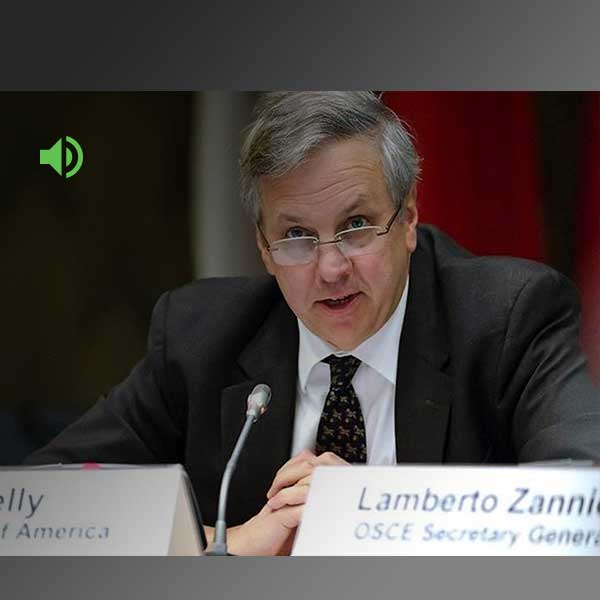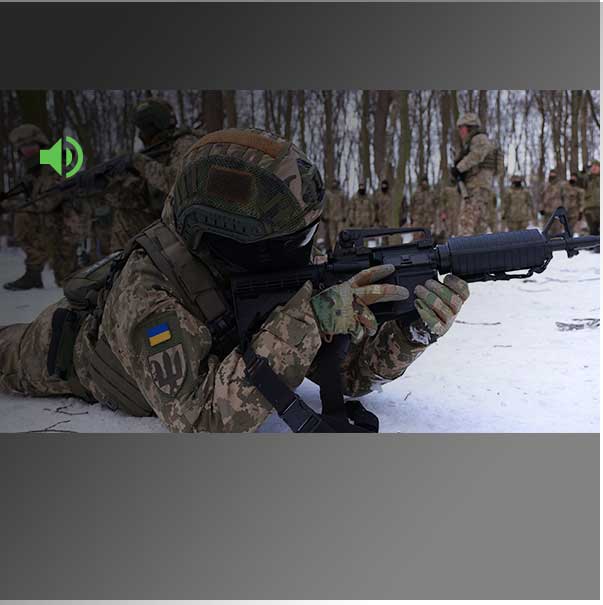George Friedman, founder of Geopolitical Futures, comes back to offer his latest assessment of the crisis in Ukraine. How have things gone for Russia so far, and what does this next phase of the war look like? Does Vladimir Putin have aims elsewhere on the map?
Below is a full transcript of the conversation, including time stamps. Full audio is posted above.
Mohamed Younis 00:07
For Gallup, I'm Mohamed Younis, and this is The Gallup Podcast. In this episode, we revisit the situation in Europe as the war in Ukraine grinds on. Dr. George Friedman is a Gallup senior adviser, geopolitical strategist and founder of GPF. Welcome back, fine sir.
George Friedman 00:25
Always good to be here.
Mohamed Younis 00:26
I've been dying to ask you this question, George. A lot has happened since we last spoke. Is there too much celebration right now going on regarding Western unity, too much focus on Putin's mistakes? In other words, isn't a win or loss here sort of defined by whether the map of Eastern Europe changes again, versus how bad the initial attempt by Putin was?
George Friedman 00:50
Well, there are two dangers to unity. One -- the war ends suddenly, and everybody goes back to wanting to repair the damage done by economic war. The other is it lasts too long, and people start saying the price for Ukraine is just too high; it's costing us too much. This is not, by the way, only a European problem; it's an American problem too. The war began as a surprise. It began with thinking that, well, we're going to get very deeply involved. It's going extra innings and so it's, unity is still there; it may stay. But, you know, if this goes for a couple of years, who knows?
Mohamed Younis 01:35
From the perspective of, you know, the revisionist approach to the end of the Soviet Union that President Putin is really trying to kind of bestow on the world, where should Western leaders draw the line of sort of holding, you know, holding their own, in terms of imposing their vision of what -- European security? I ask that because now we're hearing about potentially Zelenskyy negotiating various arrangements with the Russian side, whether it's their neutrality or them not joining NATO, them joining NATO. Where is kind of the litmus test for a win or a loss? Is it when Kiev can sort of make their decisions irrespective of what Moscow thinks? Is that not realistic? Where's the "W" here?
George Friedman 02:21
It's important to understand why Russia began this war and why it's so important to them, Putin's lovely personality notwithstanding. Russia has been invaded in the 20th century three times -- twice by the Germans. In the last invasion, they almost made it to Moscow. They didn't make it to Moscow because the borders of the Soviet Union were so far west. Had they made it to Moscow, it would have been catastrophic. As it is, 27 million Russians died in that war. Right now, the border of Ukraine in the north is 263 miles from Moscow. So a Russian national of many stripes would say, I got to have that border for the West. This can't be the case.
George Friedman 03:13
Now, Ukraine was never admitted to NATO because the West understood that that's kind of a lever that it can't stand. The problem, it became that Putin started looking at this and saying, look, the West is weak; it's divided. If I take Ukraine, it changes everything. Now, remember also that this campaign had been going on since 2000. Belarus had been essentially absorbed, informally. Belarus was critical as a Western buffer. The Southern Caucasus had been, if not absorbed, certainly under Russian oversight. Recently, we've had Kazakhstan have peacekeepers put in. So, Ukraine was sort of the last incredibly important buffer. If Ukraine was in their hands, they did not have to fear invasion.
George Friedman 04:07
And what they were afraid of, which is why they always talked about never letting them into NATO, was they were afraid that they would be admitted to NATO. The problem was that Ukraine had developed a national identity since then. And what was a minor matter from the Russian point of view, and incomprehensible why the West couldn't just accept that, you know, we're going to have to return to this border, well, because Ukraine was, was not consulted in the least and didn't want to be back under the Russian thing. And that's what happened. They went into Ukraine thinking this was a slam dunk; this is the old Ukraine. They also felt, look, the, the West is not going to be concerned about this. This is not going to be something that really upsets the West. And part of this had to do with the fact that they misread the West, but also that the West constantly misrepresented themselves.
George Friedman 05:00
The Americans, the Europeans always kind of -- particularly the Europeans -- that they were extremely flexible. They weren't worried about a war. They weren't about to let this turn into a war. And as has the war sometimes, the offensive began, and something stunning happened. And the stunning was not merely the assistance to the Ukrainians. The stunning was the economic war that was kicked off, which the Russians never expected. Kudrin, who handles financial affairs, says this has been devastating for them. It's going to take years for them to recover from it. So the economic guys want this to end, and the military guy has been sent in to fix it. Not easy.
Mohamed Younis 05:46
I'm gonna go on a limb here and assume that you agree with the conventional wisdom that we're sort of in a lull right now in the fighting, but Russia is regrouping to reengage the eastern part of the country.
George Friedman 06:00
We don't know something crucial: We don't know what the Russian reserves are. There has been -- maybe some intelligence agency knows this, but we really don't know just how many men they can muster, how much equipment they can take. And we also don't understand the morale. Sending a low-morale force into war is not a very promising thing. So one of the things I'd say, and I think -- I'm certain every intelligence agency has a theory -- my own view is, we don't know this, therefore we don't know what's about to happen. We know that there's been a change of command. We know that this particular commander doesn't like to take orders; he's going to do it his way. And we know that he believes very strongly in what it will call "counterpopulation operations." In other words, kill a lot of people. Kill them all; [inaudible].
George Friedman 06:55
And this is the mother of that. He did in Chechnya. He did that in Syria and even sent him to do this. At this point, the real question becomes, does NATO come across the border, OK? Because NATO also has something at stake now. If it lets Ukraine sink, the credibility of NATO among NATO members is badly hurt. You know, what's the point of being a member of NATO if they won't come to my assistance? So then it's a reverse situation that NATO has this thing where they do. Now, there's substantial support for intervention right now. Poland, which has built up strikingly, wants in. The Americans are heavily deployed there. The others are cautious, but there is a strange conviction among them that if they have to go, they'll go. So we're facing two brinks.
Mohamed Younis 07:51
You alluded to the change in leadership in the Russian Federation's military organization, armed forces. Obviously, we've kind of seen this unfold very tragically. You mentioned a couple of places; Syria is the one that comes closest to mind for me. A lot of speculation now about the use of chemical weapons. How realistic is it to kind of draw, dare I say, that red line there for NATO's involvement? Reflect on that.
George Friedman 08:19
Well, if, for example, chemical weapons are used in this conflict -- which, in the eyes of NATO, is an unnecessary war, a trivial war -- then why should we think it wouldn't be used elsewhere? If there is no response, then the Russians will read this -- and they frequently misread us because of the signals we send -- as, it's OK. So let's assume, for example, we have an uprising in Poland, randomly selected, and the Russians decide to invade. We have got to convince the Russians -- and Europe has to convince the Russians, above all else -- that there are boundaries that they can't cross. They never convinced them about Ukraine. Well, now it's NATO members. And if the Russians come away with the idea that they can use chemical weapons and there's not going to be any military response, the Russians understand war and are prepared to wage it.
Mohamed Younis 09:24
And I don't even want to go back through what happened in Syria, which was essentially after chemical weapons were used and confirmed to have been used, the policy was, let's work with the Russians to find the chemical weapons in Syria. That was a noneffective strategy, I think, to say the least. The other way in which, of course, Putin can escalate this is through geography, not necessarily through, you know, means of warfare. Another move that he could make somewhere else on the map of Europe -- obviously there are a series of places where there have been these kind of frozen conflicts. How realistic is that? And what are the places you're keeping your eye on?
George Friedman 10:06
Well, you know, if you're in a war, and you don't know that you're going to win it, you probably want to negotiate. But the war we're talking about is not the war in Ukraine. It is the economic can that the U.S. -- and it was the U.S. -- opened up on Russia was something Russia never expected, such a devastating economic attack. It's had a devastating effect on the Russian economy, which was fairly weak before. But its effect can't be underestimated. Somehow, you've got to negotiate it. You got to negotiate it without giving up on Ukraine, because now you're stuck with Ukraine. You can't lose Ukraine; you got to try to stay there. So you have to have some sort of asset that plays to the economic game. Not many of those around.
George Friedman 10:57
Among the few is international trade, which also runs in the ocean; it's not just a financial matter. It runs through choke points. And there are choke points. For example, Algeria ships a great deal of natural gas to here. OK. There's a shortage of that. What if the Russians try to block that through naval power? The Navies haven't been called in yet. The Denmark straits are a very important passageway. We should also not forget that the Gulf of Mexico houses three of the most important ports in the United States. The Gulf of Mexico empties out into two narrow passages -- one north of Cuba, one south of Cuba. The ability of their submarines to block those are substantial. Now, the U.S. Navy is nothing to joke at. And if the Russian Navy wants to engage the U.S. Navy, they're quite ready to have a naval battle.
George Friedman 12:06
But this is something you can think of -- if you're going to throw a Hail Mary, the Hail Mary is to create economic pain in the Americans and the Europeans. The way you can do that is to block at the naval passageways and hope that you can outfight the U.S. Navy, which they're not going to be able to, or at least convince the Americans to negotiate. Now there's a basis of negotiating. You let up on me, I let up on you. And that's going to happen. But he can't simply bleed Russia -- Putin can't bleed Russia economically while struggling for Ukraine. It's just not an equal fight. He's got to end that blockade somehow. We always look at the Ukrainian war as the key. There are two keys, and the bigger key for him at this point is growing into that blockade, that fight, this incredible ability of the United States to use the dollar as a weapon.
Mohamed Younis 13:07
I'll end with asking the question I always love to ask you, George, which is, you get the phone call --President Biden, other Western leaders say, "George as of things right now, what do I do next?" What's your answer?
George Friedman 13:20
Well, I don't want to trigger a nuclear attack. I don't want to trigger this. I don't want to trigger that. So I'm not going to go in hellbent into, into, into Ukraine. So one of the answers is begin trouble in areas that also matter to Russia. See if you can do covert operations to uprising in, in the north -- inside of Russia, there's unhappiness; can you exploit that? The problem is that you don't know if it'll work. Secondly, you don't know if it'll come public. And thirdly, and most importantly, it'll take a long time. You don't have short-term things.
George Friedman 14:01
So the first thing you have to do in that sense is simply convince the Russians there is no way they're going to win in Ukraine. I don't know you do that if you, if you don't enter. Entering the country, you're gonna have to take some risks here or concede he didn't expect to be in this test about himself. So it would be very, very helpful if Putin retired or found himself extremely ill, and another personality could take it over. Because at this point Putin is simply not trusted. It could be negotiated fairly easily without this personality.
Mohamed Younis 14:41
It's amazing there, just thinking about what, you know, the stakes of what we're considering and where the facts have taken us. George, thanks for dropping in on us. I know I'm gonna be bugging you more often than usual over the next several months as the situation develops. That's George Friedman, Gallup senior adviser and the founder of GPF. Always great to speak with you. George.
George Friedman 15:02
Good to be here.
Mohamed Younis 15:10
That's our show. Thank you for tuning in. To subscribe and stay up to date with our latest conversations, just search for "The Gallup Podcast" wherever you podcast. And for more key findings from Gallup News, go to news.gallup.com or follow us on twitter @gallupnews. If you have suggestions for the show, email podcast@gallup.com. The Gallup Podcast is directed by Curtis Grubb and produced by Justin McCarthy. I'm Mohamed Younis, and this is Gallup: reporting on the will of the people since the 1930s.



